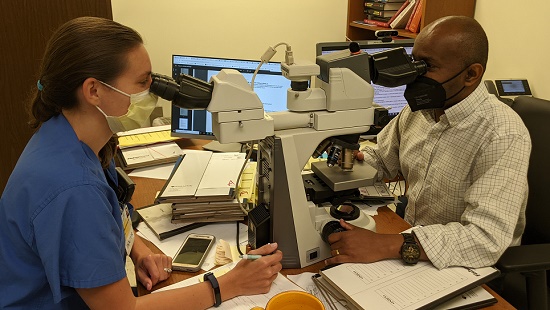Curriculum Overview

The University of Maryland Medical Center, the Baltimore VA Medical Center, and the Medical Examiner's Office of the State of Maryland combine to offer a four-year, ACGME-accredited residency program in Anatomic and Clinical Pathology.
Our patients come from the UMMC’s NCI-designated comprehensive cancer center, and our unique integrated shock trauma hospital, making for an amazing educational environment, for both bread and butter and highly complex learning material.
Residents take a three-year core program in the basic principles of anatomic and clinical pathology. Rotations include surgical pathology, autopsy, hematopathology, cytopathology, blood bank / transfusion medicine, microbiology, chemistry, and more.
Second and third year residents experience newly reorganized elective rotations to refine their interests and pursue research and quality assurance projects. The residency requirements are adapted to meet the educational and career objectives of each resident, while still meeting the requirements of the American Board of Pathology and the ACGME. As you can see, we combine military-grade organization with Ehlers Danlos-like flexibility to create world-class and personalized training for our group of 16 residents.
Our residents are heavily involved in the refinement of our curriculum, which we discuss monthly and at the annual resident retreat - so our curriculum only gets better every year! Also, our annual retreat is a blast. This year after thorough assessment of each rotation we went to a nearby escape room (we’re happy to report that our residents all escaped and are available to continue training), followed by social hour to continue the group discussion. The resulting curriculum enhancements include a new lab director rotation in CP, a new molecular genetics rotation, formalized informatics training, formalized training in diversity equity and inclusion, and restructured AP electives.
Our teaching didactic schedule ensures no holes in our trainees’ knowledge base, with rotating faculty lecture blocks every month, resident-led call conferences and journal clubs, truly brilliant unknowns sessions, and a recurring series on life as a pathologist after graduation which handles the nuts and bolts of adulting. Our alumni will fondly recall the Silverberg Lecture Series, in which residents present abstracts to the department and perfect their public speaking skills.
Residents and fellows also have many opportunities to teach, including small group preceptorship to medical students in their first and second year courses, giving lectures to pathology assistant students, gross room training of junior residents, and teaching within individual rotations. See one, do one, teach one, as the saying goes.
Residents are also assigned faculty mentors based on interests, and the discussions focus on career development, research opportunities, and wellness (not necessarily in that order).


